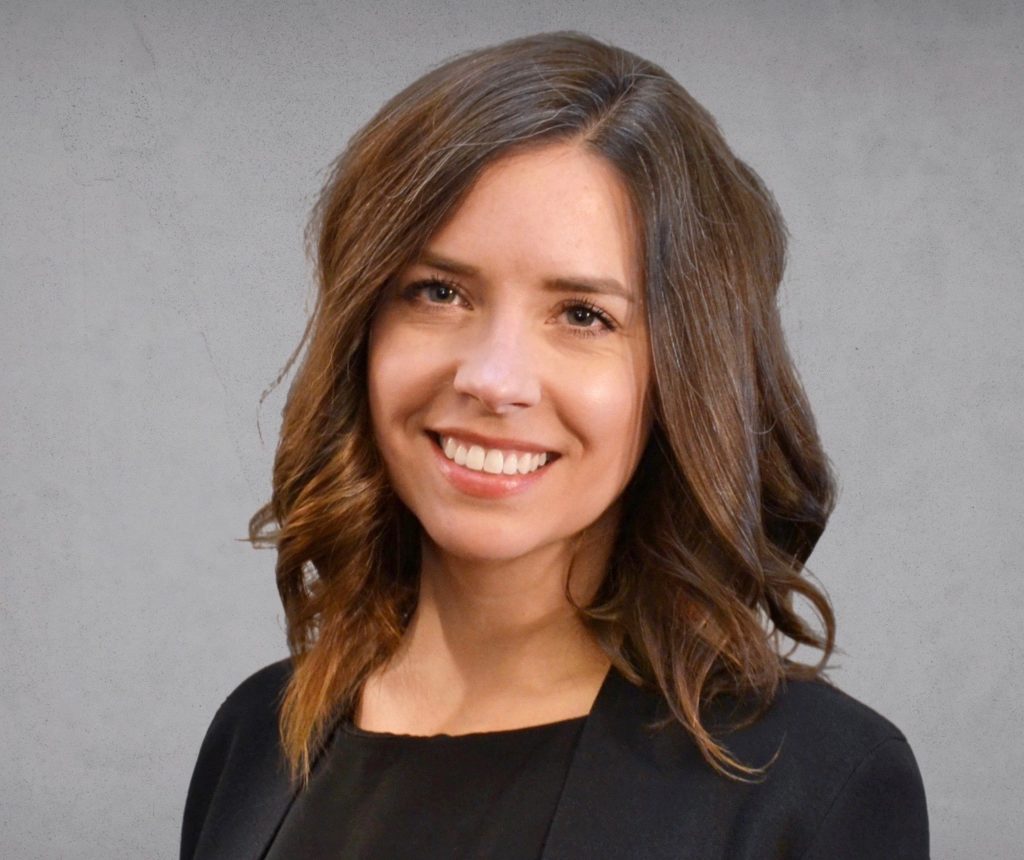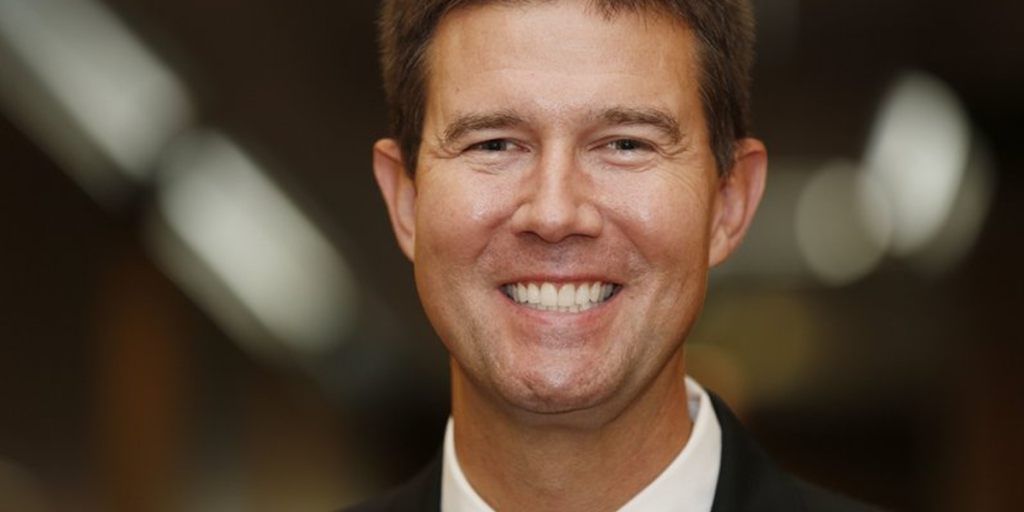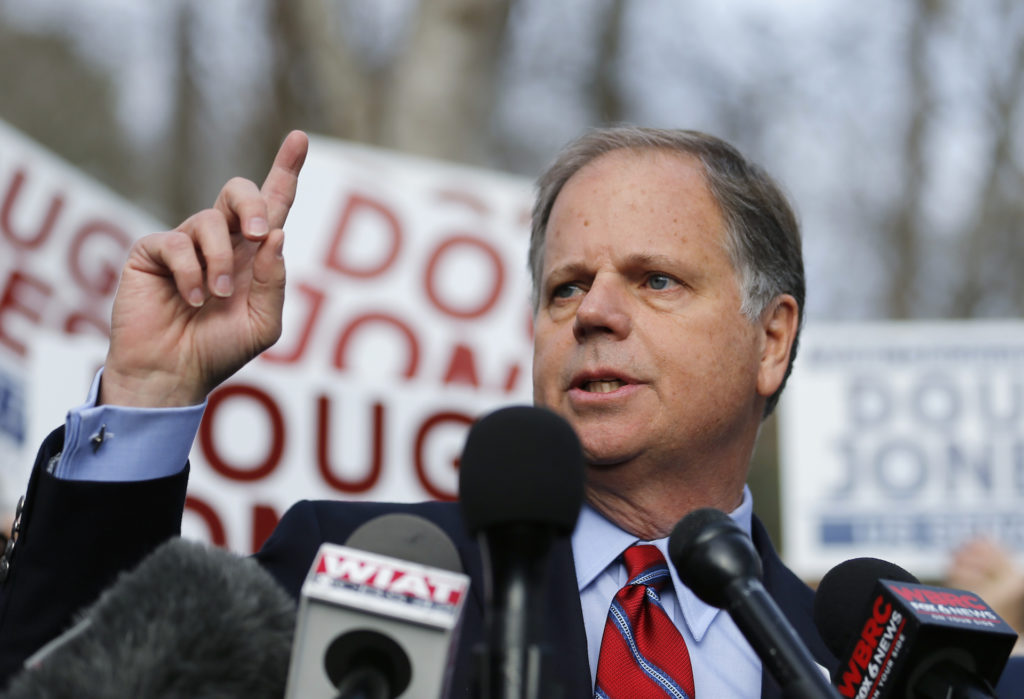Donald Trump announces plans for Pentagon to create ‘Space Force’

Vowing to reclaim U.S. leadership in space, President Donald Trump announced Monday he is directing the Pentagon to create a new “Space Force” as an independent service branch aimed at ensuring American supremacy in space. Trump envisioned a bright future for the U.S. space program, pledging to revive the country’s flagging efforts, return to the moon and eventually send a manned mission that would reach Mars. The president framed space as a national security issue, saying he does not want “China and Russia and other countries leading us.” “My administration is reclaiming America’s heritage as the world’s greatest spacefaring nation,” Trump said in the East Room, joined by members of his space council. “The essence of the American character is to explore new horizons and to tame new frontiers.” Trump had previously suggested the possibility of creating a space unit that would include portions equivalent to parts of the Air Force, Army and Navy. But his directive will task the Defense Department to begin the process of establishing the ‘Space Force’ as the sixth branch of the U.S. armed forces. He said the new branch’s creation will be overseen by Gen. Joseph Dunford, the chairman of the Joint Chiefs of Staff. “When it comes to defending America, it is not enough to merely have an American presence in space. We must have American dominance in space,” Trump said. He added: “We are going to have the Air Force and we are going to have the Space Force, separate but equal.” The president also used the White House event to establish a new policy for reducing satellite clutter in space. The policy calls for providing a safe and secure environment up in orbit, as satellite traffic increases. It also sets up new guidelines for satellite design and operation, to avoid collisions and spacecraft breakups. Trump was joined by Vice President Mike Pence, who leads the recently revived space council, and several Cabinet members, NASA Administrator Jim Bridenstine, retired astronauts and scientists. The council’s executive secretary, Scott Pace, told reporters before the meeting that space is becoming increasingly congested and current guidelines are inadequate to address the challenge. Republished with the permission of the Associated Press.
Montgomery looks to increase accessibility

When Taylor Wilkins came to Montgomery for his son’s school field trip, what he saw upset him. Several popular tour destinations were difficult or near impossible to access by wheelchair for one of his son’s classmates. At one point, the student was forced to watch the tour through a door when he couldn’t get inside a building in Old Alabama Town. The city of Montgomery has said it wants to address disability access issues and put together a comprehensive plan to comply with the Americans with Disabilities Act. By shifting the focus of the city on issues that have been brought up by advocates and residents with disabilities, the city hopes that it can influence infrastructure plans to create a more welcoming place. “I thought Montgomery, with its history of civil rights, good and bad, the ADA compliance should be there,” Wilkins said. He compared his advocacy for accessibility to some of the civil rights issues that have already been fought over in Montgomery, highlighting the fact that people with disabilities are a protected class under federal laws and regulations. “I told him how upset I was,” he said about his son’s classmate’s experience. “It was heartbreaking.” Because Montgomery is so heavily reliant on tourism, Wilkins said he was shocked to see a lack of accessibility for people with disabilities in destinations where hundreds of classes of students come each year. Patrick Dunson, city engineer and head of ADA compliance efforts in the city, said that the new efforts by Montgomery, which started a few months ago, are meant to create a long-term plan that will fix problems areas while creating a reference for future infrastructure. To better reach citizens and create their plan, Montgomery has partnered with Kimley-Horn, a development company that specializes in these projects. Dunson said the process isn’t short, simple or cheap and it will take many years, even a few decades, for the city to be completely overhauled. Resident Gene Gunter attended a session on Thursday where citizens could raise concerns about what accessibility issues they see the most and point out problem areas. Turnout was light, similar to the response to online survey on the issue. Gunter, who has spinal issues, said curb cuts, ramps and a lack of sidewalks are some of the most frequent issues he sees in the city. The meeting was a positive for him though, he said, and he was noticeably excited about the opportunities to share ways that he felt the city could improve. Geron Gadd, legal director for Alabama Disabilities Advocacy Program, said that at its essence, any type of disability access pushes are to make sure that all citizens have equal abilities to enjoy the different parts of their city. The accessibility that is required can come in many forms, she said, like streets, sidewalks, public transit and housing. As the city continues to revitalize, Gadd said, it needs to focus on making all areas of the city available to all. “There are large portions of the city where there are no sidewalks. How do you navigate from sidewalk to street when there are no curb cuts?” she said. “These are some of the issues that have been advocated for in the past. Those are things that can impair people from accessing parts of the community.” After visiting the city, Wilkins said he has talked to several officials about the issues that he saw, and he plans to continue his advocacy. “Montgomery, I’ve been in and out for 10 years, the downtown is looking a lot better, but someone should be paying this some attention,” he said, pushing back against the idea that the fixes have to be expensive and take several years to complete. “We’re talking about a thousand-dollar ramp here. It doesn’t need to be a big thing.” Republished with the permission of the Associated Press.
Five things you need to know about Heather Milam

Heather Milam won the Democratic nomination for the office of Secretary of State in the June 5 primary, but now that the primaries are over and the real battle begins. Milam will face incumbent Secretary of State, Republican John Merrill in the November 6 general election, and the two candidate’s backgrounds could not be any more different from each other. With that in mind, here are five things you need to know about Heather Milam: 1. She has a 15 year career in publishing and marketing. After graduating from Auburn University with two Bachelors of Arts degrees, Milam began her career at EBSCO Industries. Milam has also worked for a travel magazine and Network Communications Inc. the largest real estate publisher in the country at the time. At Network Communications Inc. Milam increased her markets’ revenues by 30 percent each year on average “by increasing not only print ad sales, but also digital sales including new services solely devoted to social media,” according to her bio on Weld’s website. 2. She was the General Manager and one of the founding members of the Weld for Birmingham magazine. In 2009, Milam joined the group that would eventually become Weld for Birmingham — a free community newspaper for the city of Birmingham which published weekly newspapers for six years. When the newspaper was created, Milam became the Chief Operations Officer, and General Manager for the paper. 3. She’s an entrepreneur and teaches classes at the University of Montevallo. Milam’s classifies her position at Weld as an entrepreneurial one because she joined the paper at its founding. She decided to share her experience in the classroom at the University of Montevallo’s Stephens College of Business where she teaches business management, and is the MBA program director. Milam also promotes entrepreneurial training with an innovation training program called Co.Starters. 4. She and her husband met while volunteering on a non-profit board. Milam has served in several capacities in non-profits in and around Birmingham including as a board member of the Alabama Environmental Council’s, social chair of the Birmingham Track Club, a host committee member for Growing Kings, and several other non-profit boards focusing on healthcare, education and the arts. She and her husband, Kris met while serving together on the Environmental Council’s board. 5. Her campaign’s largest donations have come from individuals, and she received a $500 in-kind contribution from the Good People Brewing company in Birmingham. Milam’s largest donations have been from individuals contributing to her campaign. In Milam’s bio on Weld’s website, she lists one of the things she likes as Good People’s IPA, a very popular beer in Birmingham, and across the state. The Birmingham Watch reported the Good People Brewing company was one of Milam’s highest campaign donors, although the donation was an in-kind one after she held her campaign kick-off event at the brewery in March.
Alabama Power withdraws from Business Council of Alabama

It’s official: Alabama Power has cut the cord from the Business Council of Alabama (BCA). Alabama Political Reporter first reported the move Monday, saying the energy powerhouse delivered a letter to BCA Monday morning stating the company was withdrawing its membership from the organization, “effective immediately.” “[W]e have become concerned that membership in BCA has become a liability rather than a benefit,” wrote Alabama Power CEO Mark Crosswhite in a letter to BCA Chairman Perry Hand and Executive Committee. He continued, “To be candid, BCA has needlessly alienated federal and state officials, failed to communicate with its own members, squandered our collective corporate goodwill, allowed its financial health to decline, and become a divisive force in our State.” The news is hardly shocking for those who have followed the Alabama Power-BCA relationship. For months, the relationship has been strained as first evidenced when Alabama Power officials made a surprise move in August, deciding the company would not support the Business Council of Alabama (BCA) Governmental Affairs Conference in Point Clear later that month.. Neither BCA, nor its employees attended the annual event as the company did not support BCA’s leadership in CEO Bill Canary and said they’re disappointed he’s failed to deliver on the association’s legislative priorities. There’s chatter more companies will soon follow in Alabama Power’s footsteps and also withdraw from the BCA. A source familiar with the situation, says Blue Cross and Regions will announce their exits next. Read Alabama Power’s full letter to BCA below: Dear Perry: Alabama Power Company has been a member of the Business Council of Alabama since BCA’s inception, and over that time has been a significant supporter of the organization. More recently, however, we have become concerned that membership in BCA has become a liability rather than a benefit. To be candid, BCA has needlessly alienated federal and state officials, failed to communicate with its own members, squandered our collective corporate goodwill, allowed its financial health to decline, and become a divisive force in our State. Since August 2017, we have expressed our concerns over the direction of BCA to the staff and officers of BCA’s Executive Committee. Simply put, we believe the to remedy these issues BCA needs new leadership and a thorough review of the governance of the organization. Despite repeated assurances that our concerns will be addressed, there has been no meaningful response. At this point, further discussions would be fruitless and a waste of everyone’s time. Accordingly, Alabama Power is withdrawing from BCA, effective immediately. Sincerely yours, Mark Crosswhite cc: Executive Committee
Five things you need to know about John Merrill

Incumbent Secretary of State John Merrill won the Republican nomination for his current position in the June 5 primary with a whopping 71.64 percent of the vote. But now that the primaries are over, the real battle begins. Merrill will face Democratic nominee Heather Milam in the November 6 general election, and the two candidates could not be any more different. With that in mind, here are five things you need to know about John Merrill: 1. He has been involved in government in some way since 1983. While attending the University of Alabama, Merrill served as a Congressional Intern for then U.S. Rep. Bill Nichols and U.S. Sen. Howell Heflin in 1983 and 1984. These internships jumpstarted Merrill’s career, leading him to several positions in local and state government at a very early age. In 1990, Merrill accepted the Assistant Director’s position at the Tuscaloosa County Industrial Development Authority where he assisted in recruiting Mercedes-Benz to the area. Merrill then served as director to many boards, and chambers in and around Tuscaloosa until 2010 when he was elected to serve as the State Representative for for District 62. In 2014 Merrill was elected to serve as Alabama’s 53rd Secretary of State, where he still serves today. 2. He is an active member of many different organizations and serves in a leadership role in several of them. According to the Secretary of State’s office, Merrill has served in leadership roles for various different community organizations including: “The Alabama Sports Hall of Fame Selection Committee, Children First Board of Directors, Friends of the Alabama Archives Board of Directors, Alabama YMCA Youth in Government Board of Directors, State Republican Executive Committee, National Rifle Association, Leadership Tuscaloosa, The Chamber of Commerce of West Alabama, United Way of West Alabama, YMCA, Boys and Girls Club, Big Brothers, Big Sisters, Boy Scouts of America, March of Dimes, Hillcrest High School Athletic Boosters Club, West Alabama Literacy Council, Alabama Constables Association & others.” “He has also served as Southeastern Regional Vice President for the National School Public Relations Association and President or Chairman of many groups, which include the Alabama Children’s Trust Fund, Alabama School Communicator’s Association and the Alabama Community Education Association, American Red Cross, Leadership Tuscaloosa Alumni Association, United Cerebral Palsy of West Alabama, Youth for Christ, Druid Civitan Club, the Tuscaloosa City School’s Vocational Advisory Council, past Chairman of the Tuscaloosa County Republican Executive Committee.” 3. He was president of the Student Government Association at the University of Alabama. While pursuing his Political science degree from the University of Alabama, Merrill served as President of the university’s Student Government Association (SGA) from 1986 to 1987. Note; Several members of the Alabama legislature have begun their political careers in universities student government associations. Governor Kay Ivey was a member of the SGA at Auburn University and State Auditor Jim Zeigler was the President of the SGA at the University of Alabama from 1970 to 1971. 4. He comes from a long line of Alabama politicians. Merrill is a descendant of former Lieutenant Governor of Alabama, Hugh Davis Merrill, member and speaker of the Alabama House, Hugh Davis Merrill, Jr., and Pelham Jones Merrill, a member of the Alabama House who fought in World War II. 5. He has represented the state in several countries including Russia. Merrill was a member of a coalition of U.S. leaders who traveled to Russia in 2016 to observe the nation’s parliamentary polls. “We had unfiltered, unbridled access and could walk in unannounced. There were no incidents I saw where people were heavily influenced to support one party or candidate over another,” Merrill told the Alabama Newscenter.
SCOTUS punts on partisan gerrymandering, let maps stand for now

The U.S. Supreme Court (SCOTUS) on Monday essentially punted on extreme partisan gerrymandering as it declined to definitively decide whether it’s constitutional for states to create electoral maps that give an advantage to one political party over another. The court took up two cases, one out of Wisconsin and one out of Maryland. In Wisconsin, the nine justices unanimously ruled against Democrats in the landmark case that challenged the state’s legislative districts they said gave Republicans an edge in the state legislature. The SCOTUS said the Democrats failed to prove they had a right to sue statewide rather than challenging individual legislative districts. “We lack jurisdiction to decide this case, much less to draw speculative and advisory conclusions regarding others,” Chief Justice John Roberts wrote on behalf of the court. The court also decided against Maryland Republicans, saying the lower court was right to leave the current system in place. The decision dashed the hopes of political reformers who were seeking a landmark ruling to change the future of American politics. The lack of definitive ruling also leaves the door open for a third case based out of North Carolina to reach the court next term.
Steve Marshall announces $100 million settlement with Citibank

Alabama Attorney General Steve Marshall announced a $100 million multi-state settlement with Citibank on Friday. 42 other attorney generals in the U.S. joined in the investigation of Citibank’s U.S. Dollar (USD) LIBOR interest rate. The interest rate is a benchmark that affects trillions of dollars of financial instruments and has a widespread impact on global markets and consumers. According to Marshall, Citibank allegedly misrepresented the integrity of their LIBOR benchmarks to both state and local governments, private trading companies, and several non-profit organizations by failing to disclose that: Citibank, at times, made USD LIBOR submissions to avoid negative publicity and protect the reputation of the bank; Citibank’s USD LIBOR submitters, on occasion, asked Citibank personnel in other units of the bank to avoid offering higher rates than Citibank’s USD LIBOR submissions Citibank expressed belief that other banks, at times, made USD LIBOR submissions that were inconsistent with their borrowing rates and contributed to inaccurate LIBORs. “As a result of its fraudulent conduct, Citibank made millions in unjust gains when government entities and not-for-profit organizations entered into swaps and other financial contracts with Citibank without knowing that Citibank and other banks on the USD LIBOR-setting panel were manipulating LIBOR submissions,” said Marshall in a news release. Several entities in Alabama including the state government, local governments and private entities (with LIBOR-linked swaps and investment contracts with Citibank) may be considered as those who were affected by Citibank’s fraudulent conduct, and may be eligible to receive recompense from a settlement fund of $95 million. The office of the Attorney General will contact those eligible for a portion of the settlement directly, the balance of the fund will then be used to pay costs and expenses of the investigation. This settlement with Citibank is the third of several USD LIBOR-setting banks to resolve claims following investigation by state Attorneys General. 42 states have collected $100 million for each state involved in the settlement. The funds will be distributed to state and local government entities and not-for-profit associations.
Family separation policy starts dividing Republicans

The emotional policy of separating children from their parents is also starting to divide Republicans and their allies as Democrats turn up the pressure. Former first lady Laura Bush called the policy “cruel” and “immoral” while GOP Sen. Susan Collins expressed concern about it and a former adviser to President Donald Trump said he thought the issue was going to hurt the president at some point. Religious groups, including some conservative ones, are protesting. Mrs. Bush made some of the strongest comments yet about the policy from the Republican side of the aisle. “I live in a border state. I appreciate the need to enforce and protect our international boundaries, but this zero-tolerance policy is cruel. It is immoral. And it breaks my heart,” she wrote in a guest column for the Washington Post Sunday. She compared it to the internment of Japanese-Americans during World War II, which she called “one of the most shameful episodes in U.S. history.” Republican Sen. Susan Collins of Maine said she favors tighter border security, but expressed deep concerns about the child separation policy. “What the administration has decided to do is to separate children from their parents to try to send a message that if you cross the border with children, your children are going to be ripped away from you,” she said. “That’s traumatizing to the children who are innocent victims, and it is contrary to our values in this country.” Former Trump adviser Anthony Scaramucci said in a weekend interview that the child separation interview could be dangerous for Trump. He said the president “should be immediately fixing this problem.” “This is a fuse that has been lit,” he said. “The president is going to get hurt by this issue if it stays out there very, very long.” The signs of splintering of GOP support come after longtime Trump ally, the Rev. Franklin Graham, called the policy “disgraceful.” Several religious groups, including some conservative ones, have pushed to stop the practice of separating immigrant children from their parents. This pressure is coming as White House officials have tried to distance themselves from the policy. Trump blames Democrats falsely for the situation. The administration put the policy in place and could easily end it after it has led to a spike in cases of split and distraught families. “Nobody likes” breaking up families and “seeing babies ripped from their mothers’ arms,” said presidential counselor Kellyanne Conway. Nearly 2,000 children were separated from their families over a six-week period in April and May after Attorney General Jeff Sessions announced a new “zero-tolerance” policy that refers all cases of illegal entry for criminal prosecution. U.S. protocol prohibits detaining children with their parents because the children are not charged with a crime and the parents are. Trump plans to meet with House Republicans on Tuesday to discuss pending immigration legislation amid an election-season debate over one of his favorite issues. The House is expected to vote this week on a bill pushed by conservatives that may not have enough support to pass, and a compromise measure with key proposals supported by the president. The White House has said Trump would sign either of those. Conway rejected the idea that Trump was using the kids as leverage to force Democrats to negotiate on immigration and his long-promised border wall, even after Trump tweeted Saturday: “Democrats can fix their forced family breakup at the Border by working with Republicans on new legislation, for a change!” Asked whether the president was willing to end the policy, she said: “The president is ready to get meaningful immigration reform across the board.” To Rep. Adam Schiff, D-Calif., the administration is “using the grief, the tears, the pain of these kids as mortar to build our wall. And it’s an effort to extort a bill to their liking in the Congress.” Schiff said the practice was “deeply unethical” and that Republicans’ refusal to criticize Trump represented a “sad degeneration” of the GOP, which he said had become “the party of lies.” “There are other ways to negotiate between Republicans and Democrats. Using children, young children, as political foils is abhorrent,” said Sen Jack Reed, D-R.I. Even first lady Melania Trump, who has tended to stay out of contentious policy debates, waded into the emotional issue. Her spokeswoman says that Mrs. Trump believes “we need to be a country that follows all laws,” but also one “that governs with heart.” “Mrs. Trump hates to see children separated from their families and hopes both sides of the aisle can finally come together to achieve successful immigration reform,” spokeswoman Stephanie Grisham said. The House proposals face broad opposition from Democrats, and even if a bill does pass, the closely divided Senate seems unlikely to go along. Trump’s former chief strategist said Republicans would face steep consequences for pushing the compromise bill because it provides a path to citizenship for young “Dreamer” immigrants brought to the country illegally as children. Steve Bannon argued that effort risked alienating Trump’s political base and contributing to election losses in November, when Republicans hope to preserve their congressional majorities. Conway and Schiff appeared on NBC’s “Meet the Press,” Collins was on CBS’ “Face the Nation,” Lujan and Bannon spoke on ABC’s “This Week,” and Scaramucci was on Fox 11 in Los Angeles. Republished with the permission of the Associated Press.
Doug Jones: Separating families “is completely contrary to our core American values”

Alabama’s newly elected Democratic U.S. Senator Doug Jones is joining a growing list of lawmakers who aren’t taking the news of immigrant families being separated at the border lightly. Jones announced Sunday night he has plans to cosponsor legislation that aims to halt the separation of immigrant families by preventing the U.S. Department of Homeland Security from taking children from their parents at the border. The bill, S.3036, the Keep Families Together Act, was introduced by Senator Dianne Feinstein earlier this month “The Administration’s new policy of ripping apart families by separating innocent children from their parents is completely contrary to our core American values,” said Jones. “As I’ve said, I have been looking at every possible option to stop this policy, to include Senator Feinstein’s legislation. While I plan to sign onto that legislation this week, we have to recognize that it is only a first step and does not offer any long term solutions to the underlying problems.” He continued, “This cruel policy needs to end now but we need workable solutions that can address this specific problem long-term. While we all wish it were true, there is no easy fix for the underlying problem. That’s why I am also joining my colleagues to call for Senate hearings on this issue as soon as possible so we can better understand what a lasting resolution could look like for these families and negate the detrimental impact to these children.”
Bradley Byrne: Fighting the opioid epidemic

For too long, a problem of epic proportion has been growing outside of the headlines in the United States: the opioid epidemic. The reality is that we can no longer wait to take action. Drug overdose is now a leading cause of death in the United States. One hundred seventy-five Americans are dying every day from this crisis. From big cities to small towns, the opioid epidemic has hit our communities hard. Unfortunately, Alabama has not been spared. According to the Centers for Disease Control and Prevention (CDC), Alabama ranks highest in the nation as having more opioid prescriptions than people. Alabama also ranks number one as the highest prescribing state in the nation for opioid pain reliever prescriptions. These statistics are incredibly alarming. An opioid is a type of narcotic derived from the opium poppy, which includes drugs such as morphine, codeine, hydrocodone, and oxycodone. While these drugs are often prescribed in response to injuries and body pains, they can be prone to abuse and addiction. The reality is many of the people who become addicted to opioids first start taking the drugs legally after receiving a prescription from a doctor. For example, I have heard testimony from athletes who suffer a sports-related injury, undergo surgery, and then become addicted to opioids during the recovery process. In many cases, this addiction can escalate, driving individuals to street drugs like heroin. Almost all of us have a loved one or know somebody who has been affected by this terrible epidemic. The personal stories are what make this nightmare a harsh reality. Right here in Southwest Alabama, I have heard far too many stories about the dangers of prescription drug abuse. The impacts of this crisis reach far beyond the person suffering from addiction to parents, to children, to brothers and sisters. So many have been hurt. On October 26, 2017, President Donald Trump announced that his administration would declare the opioid crisis a Nationwide Public Health Emergency. On a strongly bipartisan basis alongside President Trump, Congress is also responding. In March, the House voted to set aside $4 million toward combating the opioid crisis in the government funding bill for Fiscal Year 2018. We kept up the momentum last week when the House passed over 25 targeted bills to help prevent and treat opioid addiction and abuse while also ensuring our nation’s drug laws are working to stop the flow of illegal drugs. One such bill that passed the House is the THRIVE Act, which creates a program to provide low-income individuals recovering from opioid and other substance use disorders with a clean, safe, and structured environment following rehabilitation. Additionally, the House passed the STOP Act, which aims to halt opioids like fentanyl from coming into America from other countries through a loophole at the Postal Service. The majority of opioids arrive to America through the mail from other nations, such as China, Mexico and Canada. So, this legislation represents an important step to help solve the problem. It is clear that our work to end the opioid epidemic is far from over. However, I was pleased to see such strong bipartisan support for many opioid bills this week as we work to make a real difference on behalf of the American people. You can learn more about the legislation we are working on at www.opioidcrisis.gop. We cannot and will not sit back and allow the opioid crisis to take the lives of the people we love. We must fight back and ensure Americans get the help they need. I look forward to continuing the work with President Trump to end this epidemic once and for all. • • • Bradley Byrne is a member of U.S. Congress representing Alabama’s 1st Congressional District.


